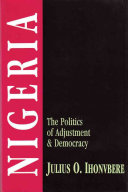
Nigeria
By - Ihonvbere, Julius OmozuanvboNigeria has become a society in which its citizens live in fear and its youth emigrate to other countries. It is now impossible to survive in the country without belonging to a certain religion, living in a particular region, having connections with top military officers, and being involved with some form of corruption. Even involvement in drug pushing or extrajudicial murder is no longer considered a crime, but a circumstance of life. Such conditions have encouraged the emergence of several popular organizations. New alliances of students, workers, women, youths, intellectuals, professionals, and the unemployed transcend ethnic, regional, and religious differences. For the author, it is at this emerging level of struggle and interaction that the future of Nigeria lies.